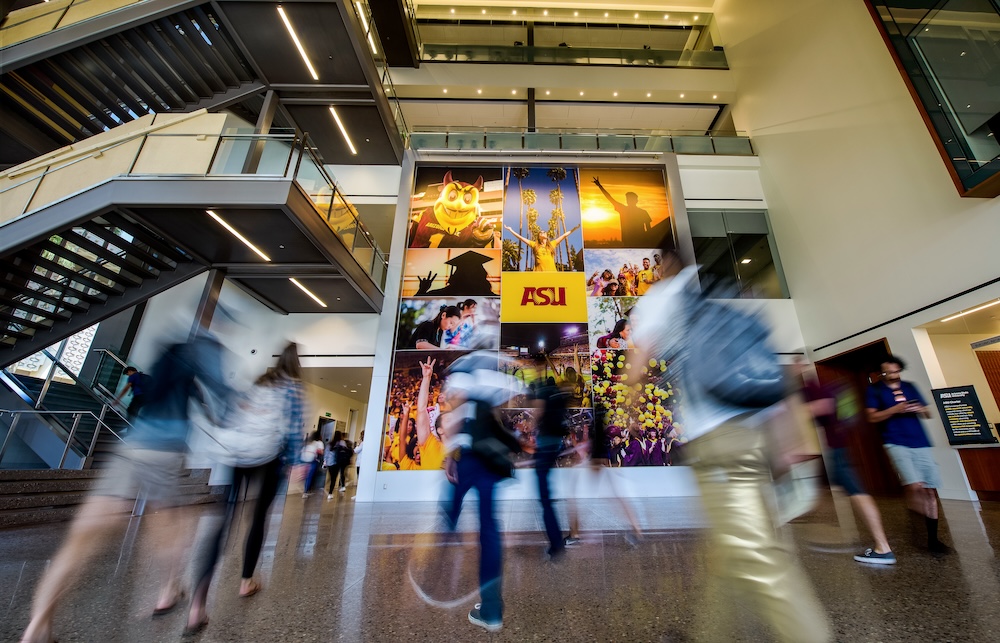Champions of change: Accessibility Coalition director discusses the importance of advocacy at ASU

Did you know that Arizona State University is home to eight coalitions that focus on uplifting students by advocating for all cultures and experiences?
Coalitions on campus give Sun Devils the chance to engage in community, connection and leadership in one place. The Accessibility Coalition, in particular, is a group that represents and advocates for the disabled community at ASU.
In recognition of Accessibility Week at ASU, our team spoke with Arwen Ching, director of the Accessibility Coalition, to gain insight into the experiences of students with disabilities and the importance of fostering a welcoming campus environment.
Ching, a second-year Sun Devil studying both biochemistry and anthropology at The College of Liberal Arts and Sciences, first got involved with the Accessibility Coalition in December 2024. When asked why she decided to take on a role within the organization, Ching discussed her personal experience as a student with disabilities.
“I have been disabled my entire life, but in the fall of 2024, I started using a wheelchair,” Ching said. “I felt really isolated. It was great to join a community where I didn't have to feel as alone.”
Ching was born with bilateral hip dysplasia and has had ten surgeries to date.
“I was in a giant spica cast when I was like three years old,” Ching said. “I had lower mobility in my hips because of the surgeries. But I was a dancer for 13 years, so I wasn't physically disabled in the same way that people might think.”
In her advocacy work, Ching champions invisible disabilities, which are often overlooked.
“I also have invisible disabilities,” Ching said. “I was diagnosed with Type 1 diabetes when I was 11 years old. That has impacted me because a lot of times, when someone thinks about a disability, they think it must be somebody who uses a wheelchair or some type of other mobility aid.
“But there are tons of invisible disabilities that affect people. In my case, I have to make sure that I have the ability to take my insulin pump with me.”
In the past year, after becoming an ambulatory wheelchair user, Ching has learned to navigate campus with a physical disability. This did not come without its struggles.
“Now that I'm in the wheelchair, I have faced a lot of infantilization,” Ching said. “When I'm out in public with my mom, she pushes me because I have weakness in my arms. People will think I’m a little kid, even though I'm 20 years old.”
Ching and other students with disabilities sometimes encounter challenges that extend into their academic experiences and influence how they are perceived in professional settings.
“People will assume that because you're disabled, you don't have the ability to do other things,” Ching said. “I'm a pre-med student, and it is a common misconception that I can't be a pre-med student because I use a wheelchair.”
When choosing what to study at ASU, Ching always knew she wanted to work in the medical field. In addition to her two majors, she has also taken on a certificate in Asian Pacific American studies.
“I'm multiracial,” Ching said. “I am part Chinese. My grandfather was born in Shanghai. In the summer of 2022, right before my senior year of high school, I did a program at ASU with Dr. Brandon Yoo about fostering awareness of the Asian Pacific American community and learning about the history that we never learned in school. I found it really fascinating.”
Ching highlighted the efforts of groups like the Accessibility Coalition and its members in creating welcoming and supportive environments for all ASU students, with a strong focus on raising awareness.
“Far too often people with disabilities are looked at like they don't exist,” Ching said. “Something that I personally have experienced is people will talk to whoever's with me instead of talking directly to me. It's important to demonstrate that disabled people are people as well. We can do anything that everyone else can do.”
“The disabled community is the only marginalized community that you can become a part of at any time. I think that far too often people take for granted their ability to not have to rely on if a place is going to be accessible or not. Advocacy is really important because it gives disabled people a voice, and it allows us to be seen and heard.”
In concluding her interview, Ching emphasized the importance of having coalitions on campus that work to create safe spaces for all Sun Devils.
“The coalitions are important because they give people who might not be able to have a voice a voice,” Ching said. “They foster this community where you're surrounded by people who understand some of the struggles that you've been through.”
“With the Accessibility Coalition, obviously we are fighting for accessibility for people who are disabled, but accessibility helps everybody.”
To learn more about getting involved with the Accessibility Coalition, click here for their website.